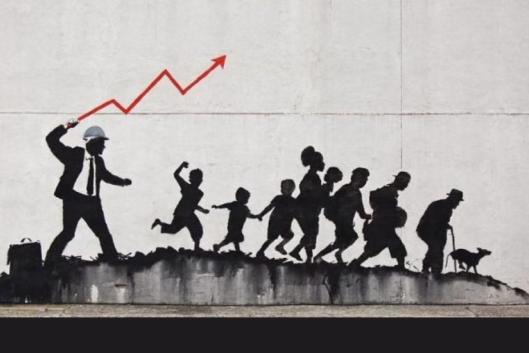We already know that excessive levels of individual consumption, resulting from the capitalist economic system, involve massive destruction of territories, water sources, forests and the livelihoods of millions of people—mainly in the global South. In many people's minds, individual consumerism is what fuels this major destruction. However, in this bulletin we do not focus on individual consumerism, though it is surely important. Rather, we probe into what is behind industrial production processes. Seeking to answer this question, we identify another kind of consumption, one that is massive and destructive: corporate consumption. The capitalist economic model itself necessitates this systematic consumption. Because of its impacts, corporations seek to hide this consumption through public relations and advertising. Corporate or industrial consumption also reveals just how central consumption is to the accumulation of capital.
One article, for example, addresses pulp producers and exporters in Espírito Santo, Brazil. In addition to planting millions of hectares of eucalyptus in forests and community territories, these companies are monopolizing the region's water supply for their factories and associated industries, causing serious social and environmental impacts. Two other articles in the bulletin warn us how public policies can also facilitate the domination of corporate consumption. One article focuses on the meat production industry—a major cause of deforestation and land grabbing—, which has influenced subsidy and trade agreement policies for its own benefit, leading to a global increase in meat consumption. Another article points to the European Union's agrofuel policy as a driver of palm oil consumption in the region, causing the destruction of tropical forests on an alarming scale.
In the face of incessant corporate consumption and its associated destruction, affected communities—together with international networks—have given visibility and publicly denounced it as well as their resistance struggles. Since bad publicity can interfere with sales and drive away investors and lenders, companies and their allies have been forced to react.
Nowadays, the most destructive companies, with the help of large conservation NGOs, can obtain "green labels"; or they can finance "offset" projects, which theoretically restore lost biodiversity or counteract emissions. Every year, corporations spend trillions of dollars on advertising campaigns, public relations and lobbying activities. Their current strategy is to sell the idea that production and industrial consumption are "sustainable" or "green."
In this vein, an article on the OLAM International palm company exposes how, among other things, certification processes actually benefit companies and reinforce a model based on constant consumption. Another article on illegal logging in Papua New Guinea discusses how, despite existing regulatory policies, illegal timber—which involves criminalization and dispossession of forest peoples—has managed to enter the United States, Japanese and European Union markets.
In the face of this trend to sell polluters as "green" companies, people continue putting up a strong resistance. In this bulletin we present four examples of resistance that expose the destruction that industrial production and consumption processes cause: the Ngäbe-Buglé indigenous peoples of Panama, who have managed to prohibit all mining and hydroelectric activity in their territories; the indigenous people—and in particular, women—of Sarayaku in the Ecuadorian Amazon, who for over 15 years have been fighting to keep oil exploitation out of their forests; the constant struggle of the Brazilian Small Farmers Movement, who assert that "producing, selling and consuming healthy foods is a political act of profound resistance to the global order, and directly challenges the agroindustrial logic promoted by capitalism"; and in Cameroon, the growing organization of women against oil palm plantations and their devastating consequences, especially for women.
Capitalist economic logic is based on the continuous accumulation of wealth in the hands of a few, which also implies sustained production and consumption. New strategies of presenting corporations with "green labels" or using discourse on sustainability do nothing more than deepen the extractive model, making consumers believe that destruction is being "offset," or that a destructive project can somehow be "sustainable."
One way we can stand in solidarity with the many local struggles, is by directly challenging the capitalist economic model—by rejecting, denouncing and exposing the various corporate strategies that seek to cover up a system of non-stop extraction, pollution and destruction.
Happy reading!
